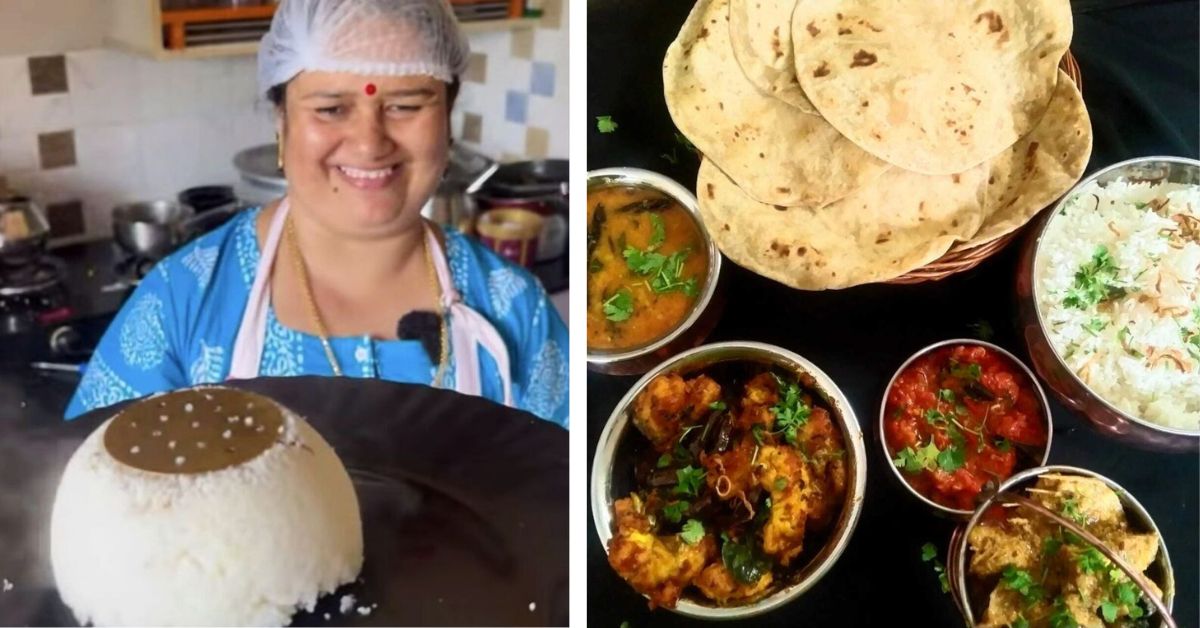How To Start a Cloud Kitchen in India? Owners Share Lessons on Licensing, Marketing & More
Raji Sakthi and Naaz Anjum, successful cloud kitchen owners from Kerala and Telangana, share insights on how to run a food business.

You know how our mothers have that one star dish everyone loves, and we always talk about how it would be a hit if we started a food business? Well, I believe all those star dishes and amazing cooks deserve recognition.
If you don’t have the resources to start a full eatery, you can still cook from the comfort of your kitchen by starting a cloud kitchen. Unlike traditional restaurants, cloud kitchens — also known as ghost kitchens or virtual kitchens — operate without a dine-in facility, focusing solely on fulfilling online orders.
If you are planning to start a cloud kitchen but are unsure where to start, we are here to do the heavy lifting for you. The Better India spoke to two women cloud kitchen owners to understand the ins and outs of the business.
1. Have faith and self-belief
Faith and self-belief are essential for starting any business. When the COVID-19 pandemic struck in 2020, Raji Sakthi from Kerala, like many others, did not lose hope. With strong support from her husband and children, she secured a gold loan and embarked on her cloud kitchen journey.
She started her venture under the name ‘From the Kitchen — Homely Foods’ and never looked back. She now gets at least 100 orders per week!
2. Start with small investments
According to Raji, in the beginning, smaller investments translate to smaller risks. Coming from a humble background, she points out, “Invest a minimal amount in the sector. Always keep these two points in mind — it’s a small homegrown business, so it takes time to see better results, and never expect to make a profit in a month or two.”
3. Know your market and consumers
Conduct market research, analyse competitors, and gather feedback to alter your menu items.
She says, “When pricing for a cloud kitchen, consider factors such as ingredient costs, labour, overhead expenses, market demand, and perceived value. It’s crucial to strike a balance between profitability and affordability while ensuring the quality of your offerings.”
4. Create an innovative menu
Hyderabad resident Naaz Anjum who started a cloud kitchen ‘Anjum’s Kitchen’ says that innovating her menu has been great for her business. While she was known and loved for her delicious homemade biryanis, she realised people might look for something more.
So she started making ‘iftar platter for one’, which includes haleem, dahi wada, fruits, and dates to attract more customers. “Introducing seasonal items like panjiri ke ladoo, and gond ke laddoo during winter can be good for attracting new customers,” she says.
5. Spread the word
Since the business is small-scale, affording a marketing strategy might be difficult.
Raji suggests, “While food delivery apps like Swiggy and Zomato can help you tap into a wider audience, it is important to take some more steps. For a cloud kitchen, platforms like Facebook, Instagram, and Google My Business are essential for reaching potential customers. Always ask customers to review your food and take that feedback into consideration.”
6. Treat the customer as the king
Raji shares that one of the biggest challenges in the cloud kitchen business is establishing brand visibility and attracting customers without a physical storefront.
“Overcoming this involves investing in a strong online presence, leveraging social media, partnering with food delivery platforms, and offering promotions to incentivise first-time orders. Maintain consistency and on-time delivery for a better customer response,” she says.
To operate a cloud kitchen in India, you need an FSSAI Food Safety And Standards Authority License, GST Registration, Health Licence, Fire and Safety License, and a Trade License. You can read more about the documents needed for applying for these licenses here.
(Edited by Pranita Bhat; All images credit: Raji and Anjum)
If you found our stories insightful, informative, or even just enjoyable, we invite you to consider making a voluntary payment to support the work we do at The Better India. Your contribution helps us continue producing quality content that educates, inspires, and drives positive change.
Choose one of the payment options below for your contribution-
By paying for the stories you value, you directly contribute to sustaining our efforts focused on making a difference in the world. Together, let's ensure that impactful stories continue to be told and shared, enriching lives and communities alike.
Thank you for your support. Here are some frequently asked questions you might find helpful to know why you are contributing?













Check what other members are talking about -
Hello pls kindly send the better India Mumbai office contact no
Where can I get this solar reflective white paint for rooftop application in Mumbai?
Where can I buy the grow bags made by Eyyo ?